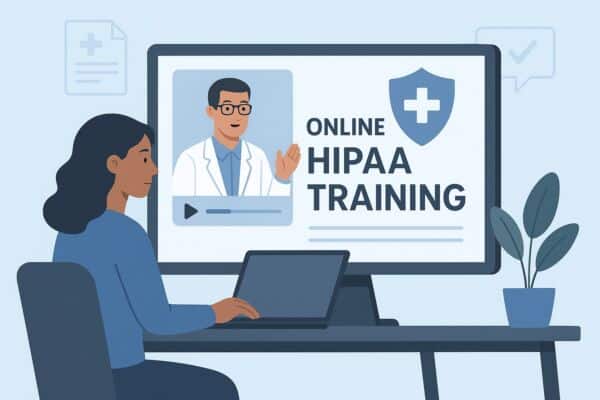In today’s fast-paced healthcare environment, HIPAA compliance is more than just a regulatory requirement—it’s a commitment to safeguarding patient trust and ensuring the confidentiality, integrity, and availability of protected health information (PHI). Yet, keeping every member of a healthcare team up to speed on HIPAA rules can be a challenge.
health information (PHI). Yet, keeping every member of a healthcare team up to speed on HIPAA rules can be a challenge.
Traditional in-person training sessions come with logistical hurdles: scheduling conflicts, limited seating, repetitive delivery formats, and the high cost of bringing an instructor on-site. Online HIPAA training offers a more efficient, cost-effective, and scalable solution. Here’s a detailed look at why it’s the smarter choice.
1. True Flexibility for Busy Schedules
Healthcare professionals—from doctors and nurses to administrative clerks—often work irregular hours and face shifting patient needs. Online HIPAA training allows them to:
-
Learn anytime, whether during a short break or after a late shift.
-
Access courses on laptops, tablets, or mobile phones for on-demand training.
-
Progress at their own pace, with the ability to pause and resume as needed.
With asynchronous online learning, there’s no need to get everyone in one room at the same time, reducing disruption to patient care.
2. Always Up-to-Date Compliance Content
HIPAA rules evolve, especially as new technologies such as telehealth and electronic health records (EHRs) become more widely adopted.
Online training providers can:
-
Update course materials immediately following regulation changes.
-
Send alerts or assign new modules when there’s an important HIPAA update.
-
Incorporate real-world case studies to help teams recognize compliance gaps.
This ensures no one is learning outdated procedures that could put the organization at risk.
3. Cost Savings Without Cutting Quality
In-person training costs can add up—venue rental, trainer fees, travel, printing materials, and lost productivity during the session.
Online HIPAA training reduces these expenses by:
-
Eliminating travel and accommodation costs for trainers or employees.
-
Offering reusable, scalable training for large teams without added per-person costs.
-
Freeing team members to take training when it’s least disruptive to operations.
4. Streamlined Tracking & Audit Readiness
Regulatory audits require proof of compliance training for all team members. Learning management systems (LMS) used for online HIPAA courses:
-
Automatically record completion dates, scores, and certificates.
-
Generate compliance reports in seconds.
-
Send reminders to employees whose training is nearing expiration.
This level of documentation makes audit preparation faster and far less stressful.
5. Engaging Learning That Sticks
A common misconception is that online training is just reading slides. Modern e-learning platforms include:
-
Video demonstrations of real-life HIPAA breach scenarios.
-
Interactive quizzes that reinforce retention.
-
Simulations that help apply theory to practice—like deciding how to handle overheard patient information.
These techniques improve knowledge retention compared to passive lecture-based learning.
Bottom Line: For healthcare teams balancing heavy workloads and strict compliance demands, Online HIPAA Training isn’t just a “nice to have”—it’s an operational advantage. It saves time, cuts costs, improves engagement, and keeps compliance airtight.
